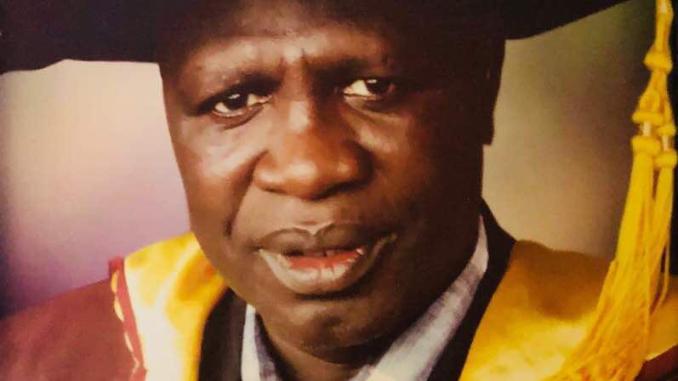Re: Economic Hardship-Nigeria Should Have No Business with Hunger
Re: Economic Hardship-Nigeria Should Have No Business with Hunger
Re: Economic Hardship-Nigeria Should Have No Business with Hunger
By Prof. MK Othman
Dr. Godwin Atser, the Country Director of Sasakawa Africa Association (SAA), Nigeria, was invited to the Kadaria Ahmed Program on African Independent Television to participate in the panel of discussants on the live program held on Wednesday, 24th, 2024.
The subject of discussion was “the Nigerian Food Security situation.” There were three discussants: Dr. Atser, Senator Aliyu Sabi Abdullahi, Minister for State, Federal Ministry of Agriculture and Food Security, and Hajia Halima Njobdi, COE of “Give Agriculture a Voice,” an agriculture-based NGO. As a consultant and friend of SAA, the CD invited me to join the event’s audience. Madam Ahmed, the program’s anchor, made it a soul-searching occasion where agricultural policies and government programs were subjected to the reality on the field. The Program, codename “Pivotal,” commenced with interviews of farmers on agrarian programs for food security.
One of the interviewees from Zamfara bitterly complained about the calamitous activities of the bandits on the field. He said he lost his farm manager to a bandits’ attack in 2014. Since then, his farming activities have been nosediving, “our major challenge to farming is not capital or even inputs but murderous insecurity, preventing us from going to farms,” he asserted. The Minister, the outspoken Senator Abdullahi, who was the spoke person of the upper chamber at the ninth Assembly, has so much to say about government efforts to achieve food security, but time did not permit him. At a point, he quarried Kadaria, “You asked me a question, and you did not give me enough time to respond.”
Neither the panelists nor the audience had enough time to discuss the burning issue of food security and its twin sister, poverty, ravaging the land. Dr. Atser eloquently talked about climate change; the discussion coincided with our visit to SAA Mega Field Day in Assakia, Nasarawa state, where rice production technology that combines decarbonization and soil health improvement was demonstrated. Dr. Atser talked about regenerative agriculture, reduction in greenhouse emissions, Soil health improvement, productivity enhancement, and other technologies showcased by SAA in 18 states.
The Minister mentioned receiving 2 million bags of assorted fertilizer from the Central Bank of Nigeria (CBN) for onward distribution to the farmers. He said the fertilizers were being analyzed to determine their quality. In my comments, I commended Senator Ahmed Tinubu’s government for arresting the CBN’s direct involvement in implementing a government agricultural program, which has always resulted in massive failure and corruption. I asked the Minister why the fertilizers were not distributed now that the 2024 wet season has earnestly commenced and the fertilizer price has reached 45,000 Naira for 50 kg. Flooding the market with 2 million bags of fertilizer will crash fertilizer prices and support the farmers.
The Minister did not have time to answer my question and several other questions due to time constraints. Nevertheless, I watched the Minister take note of all the comments, and hopefully, he will act appropriately to change the narrative. Nigerians eagerly await positive action to salvage the situation and quench hunger.
In a related development, I am presenting some comments from my readers on the 2-part food security article published in the last two weeks. Happy reading.
Prof, our political leaders and top-ranking public officers have captured our country, and they do not have the WILL to do what is right. They are selfish, greedy, and self-centered.
How, for example, can a government declare an emergency on food security without a clear-cut strategy to accomplish it? Farmers are sacked from farming by terrorists, and yet the authority is handling the insecurity with kid gloves. The national productivity is low due to a lack of investment. Yet, we use our limited forex reserves to invest in foreign economies, e.g., buying several vehicles valued at over $150 million. The government increases the prices of goods and services astronomically without improvement in the quality of the goods and services. We are a people of several contradictions.
As long as we choose who leads by ethnicity, religion, and the highest bidder, and we shy away from what we know is right, it will undoubtedly take a long time for the desired change to occur.
Mr. Ifidon Hmmmmmm, Prof. You said it on point. All the policies, the recommendations at conferences and symposia, and research findings on the shelves of research institutes are available, but the political will to implement them is lacking. If our nation is sincere, we can still do better than the temporary fixes. I still ask where the state of emergency declaration of Mr. President is in the agricultural sector. What about the return of the commodity boards? If removing subsidies and floating the Naira is so simple and implemented within the twinkle of an eye, why not in the agricultural sector?
Haba PBAT Prof Sani Isiaku All these laudable projects will come to fruition when there is honesty and sincerity of purpose in execution. Corruption is our number one enemy. The failure of most projects can be directly linked to it. Ethnic bias, nepotism, and sectionalism can be traced to the failure of some projects or the non-execution or completion of some dams and associated irrigation projects. The non-completion of the Biu Dam project can be directly attributed to the reasons above.
Prof Gibson Dear Prof., It was an interesting article. I hope our governments at all levels will find it worthy of implementation. The greatest challenge is our government’s lackadaisical attitude to critical suggestions coming from professionals. May Allah guide our leaders right, Ameen. Best regards, sir.
Alhaji Yarima Good talk, Sir; I wish you all the best. Abdul Dari.
Re: Economic Hardship-Nigeria Should Have No Business with Hunger



